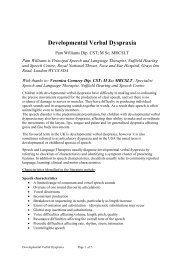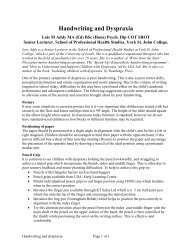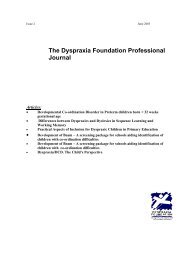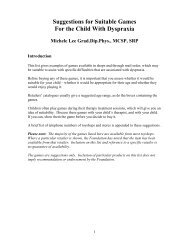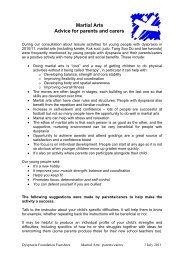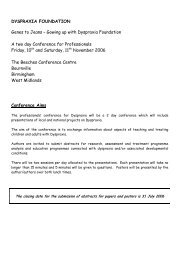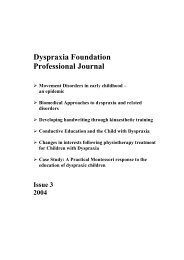Employers Guide - Dyspraxia Foundation
Employers Guide - Dyspraxia Foundation
Employers Guide - Dyspraxia Foundation
You also want an ePaper? Increase the reach of your titles
YUMPU automatically turns print PDFs into web optimized ePapers that Google loves.
<strong>Dyspraxia</strong> <strong>Foundation</strong> <strong>Guide</strong> For <strong>Employers</strong><br />
Case Study: George<br />
George was an engineer. He had good<br />
people skills and was valued by his company.<br />
George was promoted and transferred to<br />
a new area where he had several others<br />
working under him. He was challenged by<br />
his new job and enjoyed it greatly. The only<br />
drawback was the volume of material he<br />
was now expected to read and he read<br />
very, very slowly. He did however maintain<br />
that he read better than others. He solved his<br />
problem by taking work home to read. The<br />
volume of reading grew and he found he now<br />
spent all Sunday reading. Then his first child<br />
was born and time took on a new framework.<br />
George no longer had Sundays to read. He<br />
found that he did not keep up to date with<br />
material and his work could not be completed<br />
efficiently. He felt he was out of control and<br />
visited the doctor for stress. He was given<br />
anti-depressants which made him sleepy.<br />
George began to think he was not up to the<br />
promotion.<br />
When his parents came to visit him they were<br />
shocked at how George looked and<br />
discussed it with his wife. She told them about<br />
the Sunday reading and the difficulty since<br />
the arrival of the baby. George’s parents<br />
confirmed reading had been a problem<br />
throughout his school life and in fact he had<br />
always said he became an engineer so he<br />
didn’t have to read. At school it had been<br />
suggested that George was dyslexic but he<br />
had received no formal assessment. George ‘s<br />
family persuaded him to have a<br />
psychological assessment. Dyslexia was<br />
diagnosed and the psychologist suggested<br />
some visual motor difficulties could be at the<br />
root. He also saw a specialist optometrist who<br />
suggested he have glasses with coloured<br />
lenses and a prism to help his eyes work as a<br />
coordinated team. George could not believe<br />
the improvement in his reading.<br />
George went into work and saw his manager<br />
who had been concerned about the fall-off in<br />
George’s work. It was agreed the line manger<br />
would prioritise what had to be read and<br />
identify what was not a priority. He also<br />
highlighted important passages. Some reading<br />
was delegated to other staff members who<br />
could then report the content to George. The<br />
manager also suggested George take time<br />
out to read in a quiet office while his staff take<br />
his phone calls. George felt this was unfair<br />
on his staff. So the quiet office was offered<br />
to all staff for an hour each week while the<br />
rest of the team fielded calls. The staff all<br />
found this useful and the staff productivity<br />
and morale went up. Another person in the<br />
team disclosed that he had dyslexia and<br />
George helped<br />
with resolving<br />
his difficulties.<br />
George’s manager<br />
who had initially<br />
been sceptical<br />
about the idea<br />
of cognitive<br />
processing profiles<br />
became a convert<br />
and promoted the<br />
process of staff<br />
training in<br />
Neurodiversity for<br />
all employees.<br />
Produced by Key 4 Learning Ltd



